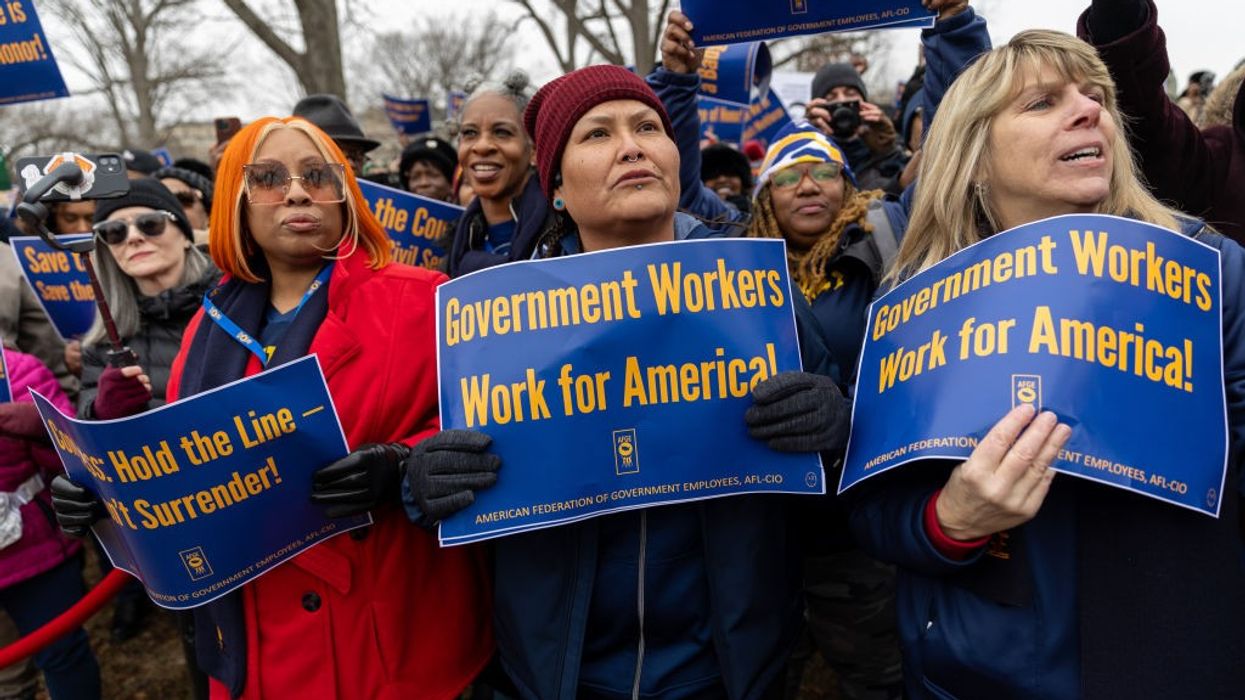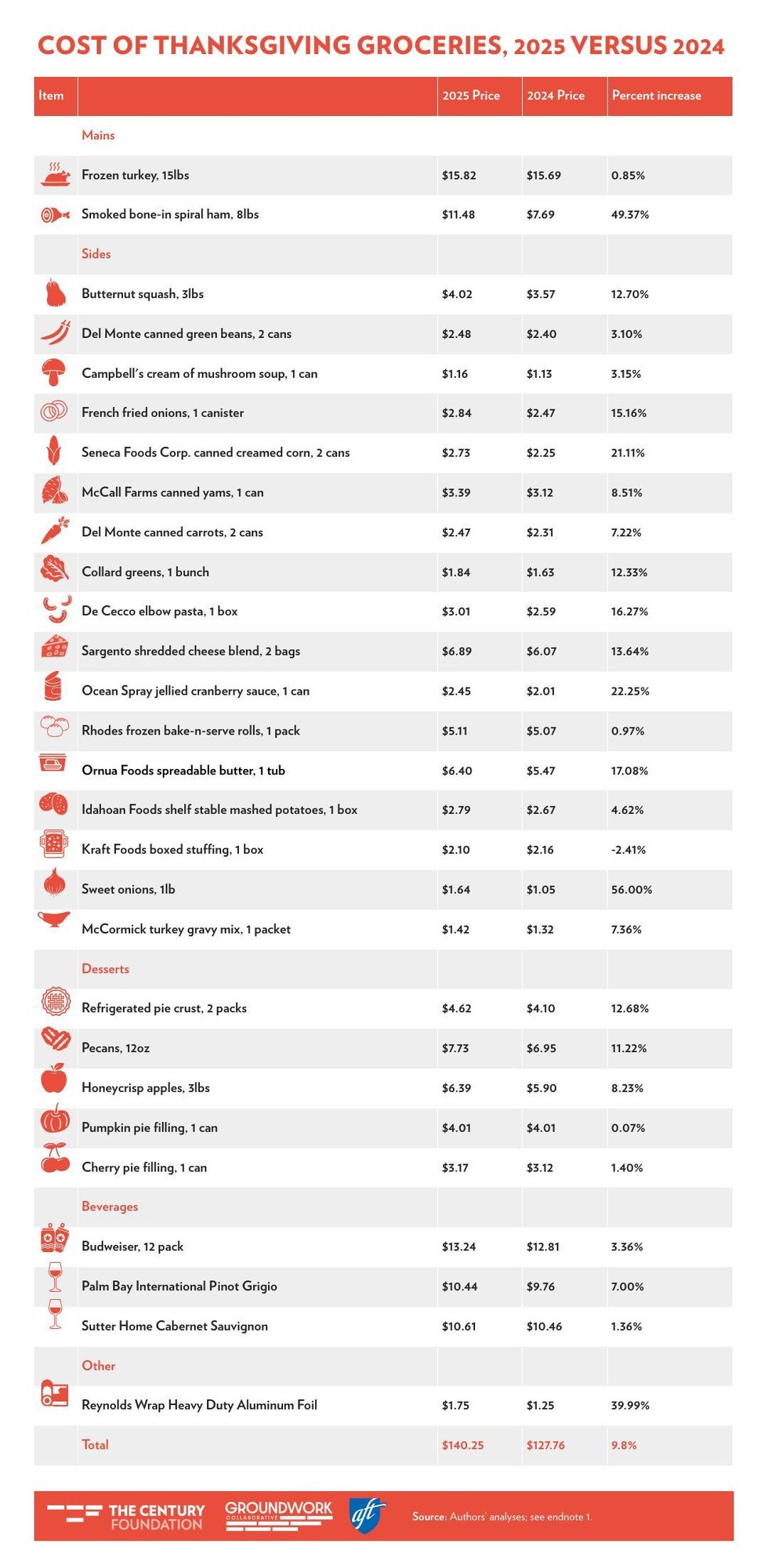Trump was technically correct that Walmart had reduced the cost of its Thanksgiving dinner by about 25%. What he neglected to mention, however, was that it had also considerably reduced the meal's size, down from 29 individual items to 22.
The most recent Consumer Price Index (CPI) data published in September by the Bureau of Labor Statistics, meanwhile, shows that at-home grocery prices have actually risen by 2.7%. That, not the spin coming from the White House, is what voters appear to be absorbing as Thanksgiving approaches.
In a poll conducted last week by Data for Progress, 53% said they felt it would be harder to afford a typical Thanksgiving meal than last year, while just 13% said it would be easier. Meanwhile, over a third said they were compensating for rising costs by buying fewer items.
That survey was done in collaboration with the Groundwork Collaborative, the Century Foundation, and the American Federation of Teachers (AFT), which published a report on Friday showing the skyrocketing cost of several holiday staples over the past year, in large part due to Trump’s aggressive tariff regime.
 Graphic by the Century Foundation, Groundwork Collaborative, and American Federation of Teachers
Graphic by the Century Foundation, Groundwork Collaborative, and American Federation of Teachers
While the cost of a 15-lb. frozen turkey has remained roughly steady, the report notes that this is a bit of a mirage.
"Typically, retailers use frozen turkeys as a loss leader, discounting them to get customers in the door to purchase the rest of their Thanksgiving meal, so it’s no surprise that frozen turkey prices are steady," it explains. “However, wholesale prices for frozen turkeys have soared 75% over the past year, according to research from Purdue University, and fresh turkey prices are up 36% and likely to continue rising.”
The report attributes these sharp increases to a perfect storm of Trump policies: "Tariffs have driven up the cost of feed and avian flu," which has worsened as a result of mass firings at the US Department of Agriculture, "has further thinned an already shrinking flock, now at its lowest level in four decades, squeezing American farmers and consumers alike."
Those who prefer pork or beef to turkey will not be so lucky: The price of an 8-lb. smoked bone-in spiral ham has jumped from $7.69 last year up to $11.48, a nearly 50% increase, while beef roasts are up 20%.
But many agree that the sides are what truly make a Thanksgiving meal great, and that’s where Americans’ pocketbooks will take the most significant hits.
The cost of sweet onions, an essential ingredient in stuffing, has spiked by 56% since last year. Ocean Spray jellied cranberry sauce and Seneca Foods' creamed corn have each jumped by over 20%. And elbow macaroni from De Cecco and the Sargento cheese to put on top have each increased by double digits.
Pie fillings like pecans, apples, and the refrigerated crusts they're served in have also all lept several times the rate of inflation. And even storing leftovers will be more costly, with heavy-duty aluminum foil from Reynolds up 40%.
The report chalks this up to Trump's 50% tariffs on imported steel, which affect around 4 in 5 canned goods. Canned fruits and vegetables have increased by 5% over the past year, faster than the overall rate of inflation. These price hikes, meanwhile, have given companies cover to raise the prices of goods made with domestic steel, too.
Making Thanksgiving dinner with fresh fruit and vegetables may skirt some of the hikes, but tariffs on fertilizer and herbicides have also driven prices up by about 2.5%.
Tariffs on aluminum, meanwhile, have caused Reynolds' CEO to increase the prices not just of foil, but also of other products to help absorb the cost.
The report by Groundwork, the Century Foundation, and AFT is not the only one to examine the cost of Thanksgiving foods, which are often used as a shorthand for the state of inflation.
While estimates vary based on methodology—for instance, the American Farm Bureau notes that the loss leader pricing of turkey is enough to reduce the price of a Thanksgiving meal on the whole from last year—reports across the board have found that the prices for most Thanksgiving staples are rising in tandem with food prices more broadly.
“This Thanksgiving, the main course is inflation as Trump’s policies force families to carve up their shrinking budgets," said Lindsay Owens, Groundwork's executive director.
Rising food prices are just the tip of the iceberg for a mounting affordability crisis: Data shows similar hikes to housing and energy costs. Meanwhile, the cost of health insurance premiums is expected to more than double next year for over 20 million Americans and increase across the board after Republicans voted not to renew a tax credit for the Affordable Care Act.
“This administration’s policies made the cost of living higher than the year before,” said AFT president Randi Weingarten. “We must do everything we can to make it easier, not harder, for working Americans to afford groceries, housing, and healthcare.”





